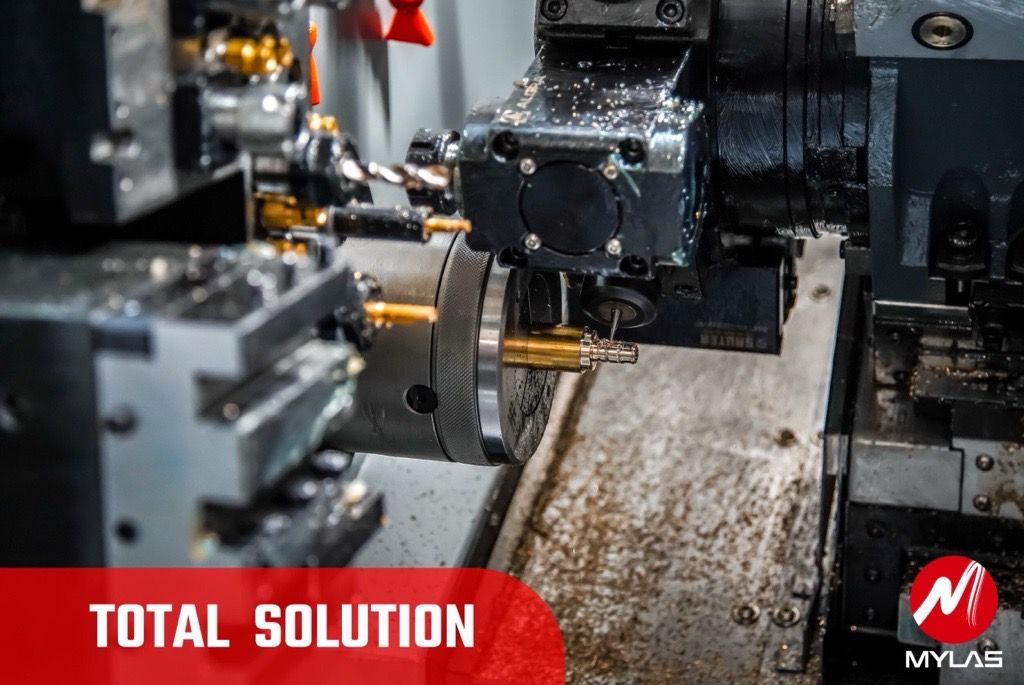Tag Result
#multitaskingmachine
How many pieces can be done once in the machine?For machine users, it's a big issue when considering machine purchasing. In the first beginning, the cost of a multitasking machine is much higher than a CNC lathe or auto cam lathe.If the standard of workpiece accuracy is high, the multitasking machine may not be the best answer. However, the multi-tasking machine will be the one if the requirement of product quantity and accuracy are both high.Even if, the cost of a multi-tasking machine is the highest of these three types of machines. The double system can save half cycle time because of the double system simultaneously machining. Nevertheless, it's not enough for Mylas.We wish we can help our partner not only with machines but also with production processes. Our engineer team would support our customers to optimize the original machining process as possible as they can.Why don't you try it now?Send us your demand: Sales@mym.com.tw#Double #Dualsystem #aerospace #automotive #bike #bicycle #mechanicalindustry #CNC #CNClathe #lathe #Automaticsolution #multitaskingmachine #customized #afterservice #robot
1. **Guide: How to
Recommend Efficient CNC Mill-Turn Machines for the Automotive Manufacturing
Industry**
In the automotive manufacturing industry,
choosing the right CNC mill-turn machine is crucial because the efficiency and
precision of these machines directly impact production quality and
cost-effectiveness. Here are some key considerations to help agents recommend
the most suitable CNC mill-turn machines for the automotive manufacturing
industry:
l Understanding the Specific Needs of the Automotive Manufacturing
Industry
The automotive manufacturing industry has
specific requirements for CNC mill-turn machines. These include high precision,
high speed, and high stability in machining capabilities, as automotive parts
must meet strict quality standards and production specifications. Additionally,
as automotive designs become increasingly complex, CNC machines need multi-axis
machining capabilities to handle intricate geometries and fine details.
l Evaluating Machine Specifications
Agents should thoroughly understand the
technical specifications of various CNC mill-turn machines, including spindle
speed, tool change time, machining range, and precision. For the automotive
manufacturing industry, high-speed, high-precision machines can significantly
enhance production efficiency and reduce defect rates. Therefore, agents need
to evaluate and recommend machines based on these technical indicators.
l Reliability and After-Sales Service
Automotive manufacturing is highly
dependent on equipment reliability. Machine stability and durability are vital,
so agents should choose brands with a good market reputation and strong
technical support. Additionally, high-quality after-sales service is crucial,
including prompt repair responses and regular maintenance services, ensuring
long-term stable operation and reducing the risk of production downtime.
2.
**Perspective: Choosing the
Best CNC Mill-Turn Machine Suppliers in the Global Market**
Choosing suitable CNC mill-turn machine
suppliers for the automotive manufacturing industry in the global market
requires in-depth analysis and careful decision-making. Here are some key steps
to help agents screen and evaluate the best suppliers in the global market:
l Evaluating Technical Strength
Firstly, the supplier's technical strength
is a core factor in decision-making. Agents should assess whether the supplier
possesses advanced technology and research and development capabilities and can
provide high-precision, high-speed, and high-stability CNC mill-turn machines.
The supplier's technical strength directly relates to product quality and
performance, so careful evaluation is necessary.
l Confirming Product Certification and Standards
In the global market, different countries
and regions have various certifications and standards for machinery and
equipment. Agents need to confirm whether the supplier's products meet local
safety standards and quality certifications, impacting the legality of product
imports and the safety and reliability of usage.
l Assessing After-Sales Service and Support
After-sales service and technical support
are important considerations when choosing suppliers. High-quality after-sales
service ensures that machines receive timely repairs and maintenance during
operation, reducing downtime and production losses. Agents should understand
the supplier's after-sales service network and technical support capabilities
to ensure they can meet the long-term needs of customers.
l Referencing Customer Reviews and Case Studies
Agents can reference other customers'
reviews and successful case studies to judge the supplier's reliability and
market reputation. Successful cases and good reviews can boost the supplier's
credibility, helping agents make more confident decisions.
3.
**Improving Automotive Parts Production
Efficiency: How Customers Choose CNC Mill-Turn Machines**
In the automotive manufacturing industry,
selecting the right CNC mill-turn machine is crucial for improving parts
production efficiency. Here are some key steps to help automotive manufacturing
customers choose the most suitable CNC mill-turn machine:
l Analyzing Production Needs
Firstly, customers need to analyze their
production needs in detail, including the types of parts, machining precision
requirements, batch sizes, and production speeds. These factors directly impact
the required machine specifications and performance. For example,
high-precision, multi-axis CNC mill-turn machines are ideal for parts requiring
high precision and complex geometries.
l Evaluating Machine Performance
Performance evaluation is key when choosing
CNC mill-turn machines. Customers should consider technical indicators such as
spindle speed, machining range, automatic tool change systems, and tool life.
High-performance machines can significantly improve production efficiency,
reduce production costs and defect rates, and ensure product consistency and
quality.
l Considering Operational Convenience and Maintenance
The operational convenience and maintenance
needs of machines are also important considerations in the selection process.
User-friendly machines can reduce training time and improve operator
efficiency. Additionally, low maintenance needs and convenient repair services
can reduce downtime and ensure continuous and stable production.
l Understanding After-Sales Service and Support
Choosing suppliers with excellent
after-sales service and technical support is crucial. Customers should
understand whether the supplier provides comprehensive after-sales services,
including installation and commissioning, operation training, regular
maintenance, and emergency repairs. High-quality after-sales service ensures
long-term stable operation and reduces production risks caused by machine
failures.
4.
**Case Study Analysis: Application of CNC
Mill-Turn Machines in the Automotive Manufacturing Industry**
Case study analysis is an effective way to
understand the application and effects of CNC mill-turn machines in the
automotive manufacturing industry. These cases demonstrate how these machines
significantly improve production efficiency and quality.
l Successful case studies showcase the significant advantages of CNC
mill-turn machines in the automotive manufacturing industry, including improved
production efficiency, reduced defect rates, and enhanced product quality. By
applying these advanced machines, automotive manufacturers can achieve
modernized and automated production, meet the ever-changing market demands, and
maintain a competitive edge. Agents can use these cases to demonstrate the
value and application effects of CNC mill-turn machines to potential customers,
promoting sales and establishing strong cooperative relationships.
5.
**The Long-Term Investment Value of CNC
Mill-Turn Machines in Automotive Manufacturing**
In the automotive manufacturing industry,
investing in CNC mill-turn machines is not only to address current production
needs but also to achieve long-term economic benefits and competitive
advantages. Here are some long-term investment values that CNC mill-turn
machines bring to automotive manufacturers:
l Improving Production Efficiency
CNC mill-turn machines can integrate
multiple machining processes, completing turning and milling in one setup,
significantly improving production efficiency. Efficient automatic tool change
systems and precise numerical control technology can shorten production cycles,
increase output, and meet the demand for rapid delivery.
l Reducing Production Costs
High-precision CNC machines can
significantly reduce defect rates, minimize r material waste, thereby lowering
production costs. Additionally, the durability and stability of these machines
mean fewer maintenance needs and downtime, further saving operational costs.
l Enhancing Product Quality
The high-precision machining capabilities
of CNC mill-turn machines ensure the consistency and quality of each part. This
is crucial for the automotive manufacturing industry, as high-quality parts can
improve overall vehicle performance and safety, enhance consumer confidence,
and boost brand image.
l Increasing Competitiveness
Investing in advanced CNC technology allows
automotive manufacturers to adapt to market changes and technological
challenges, maintaining a competitive edge. As automotive designs become
increasingly complex, CNC mill-turn machines with multi-axis machining
capabilities and flexibility can meet the growing product demands, winning more
market share.The TM-1700 series of fully automated
machining equipment from Taiwan LEADWELL Computer Machinery is designed to meet
the needs of high-efficiency precision machining. It can quickly manufacture
various industrial parts, including automotive, aerospace, and electronic
products. Our advanced machines are equipped with flexible parameter settings
and a variety of tool head options, making it possible to produce parts of
various specifications and sizes, greatly enhancing productivity and
operational efficiency.
We use cookies to optimize and continuously update it according to your needs.The settings can be changed at any time under "Privacy"









